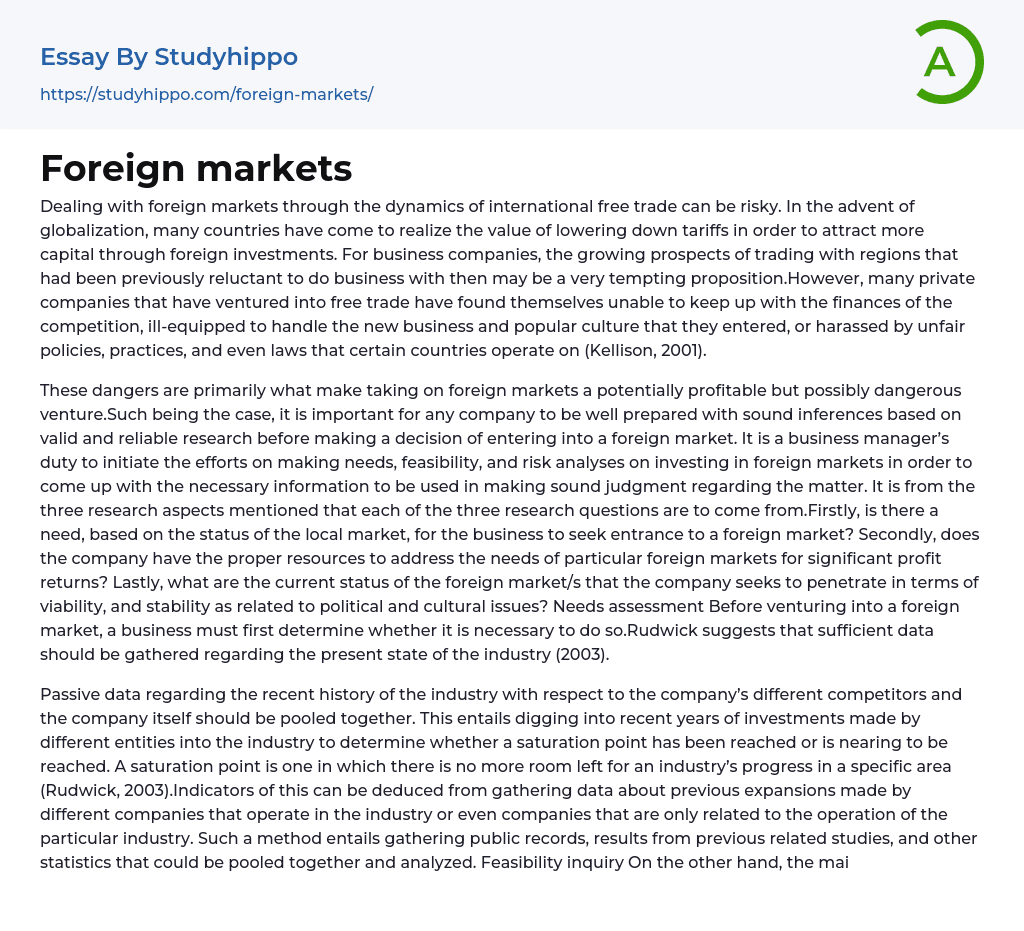In the context of globalisation, engaging with foreign markets through international free trade can involve significant risks. Many countries have recognised the importance of reducing tariffs to encourage more capital via foreign investments. While trading with previously reluctant areas may seem attractive for companies, many private enterprises embarking on free trade have found themselves unable to match their competitors' financial strength, unprepared for cultural differences and unfamiliar business environments or subject to unjust policies and laws in certain nations (Kellison, 2001).
Thorough and reliable research is essential for companies before they enter foreign markets, as it can be both profitable and dangerous. Business managers must take the lead in analyzing a market's needs, feasibility, and risks to make informed decisions. The three research aspects - needs analysis, resource assessment, and market viab
...ility - inform three crucial questions: firstly, does the local market demand expansion into a foreign market? Secondly, does the company possess adequate resources to meet requirements for significant profits in a specific foreign market? Lastly, what is the current political and cultural stability of potential foreign markets? Rudwick (2003) emphasizes the importance of conducting sufficient industry research prior to entering a foreign market.
To determine if a saturation point has been reached or is close to being reached in the industry, it is essential to gather passive data about the recent history of the industry as well as the company's competitors and the company itself. This requires analyzing investments made by various entities in the industry over recent years. The saturation point represents a state where there is no further room for the industry's growth in a specific area (Rudwick, 2003). To recognize whether
such a point has been reached, one can examine information on earlier expansion efforts by different firms operating in or related to the industry. Collecting public records, results from prior studies and statistics is a part of this process. Meanwhile, the second research question focuses on determining foreign markets where there is demand for the company's business feasibility.
This involves collecting consumer feedback about the operation of a specific business in order to determine if it can handle the financial and cultural obstacles of expanding into new territory. Gathering opinions from various sectors of the target market is the method for obtaining more involved data and drawing conclusions on the demand for the business in a foreign market (Kellison, 2001).
Conducting extensive surveys in various sectors of a foreign territory is crucial for effective research. Simply relying on passive data from past records would not be enough to accurately determine current demand for a product or service, as well as customer expectations for delivery or service. To conduct successful research, a combination of information gathering methods is typically necessary. Feasibility inquiries can identify target markets, which should then be assessed for potential risks if the company chooses to invest.
The process of gathering data involves the collection of stock exchange history to obtain passive data, while taking into account socio-political issues that may affect the company. Additionally, active data can be gathered by analyzing public opinion on government, foreign investment, and the company's products in general. Research In Motion, a gadget manufacturer, fell victim to China's abusive corporate practices due to their lack of comprehensive assessment on the perils of investing in a hostile state (Hesseldahl, 2006).
To avoid such circumstances, it is essential to conduct a thorough assessment of potential risks when investing. The gathering of passive and active data require different methods and must be treated accordingly.
To adequately address research questions, specific approaches tailored to the required data must be developed and considered. Using an inappropriate method may result in insufficient data for analysis, leaving the study unable to answer its intended questions effectively.
- Absolutism essays
- Appeal essays
- Bourgeoisie essays
- Contras essays
- Corporate Governance essays
- Corruption essays
- Democracy essays
- Democratic Party essays
- Developed Country essays
- Dictatorship essays
- Elections essays
- European Union essays
- Federalism essays
- Foreign essays
- Foreign policy essays
- Gentrification essays
- Hillary Clinton essays
- Income Tax essays
- International Relations essays
- John Marshall essays
- John Stuart Mill essays
- Left-Wing Politics essays
- Liberty essays
- Military essays
- Monarch essays
- Monarchy essays
- Political Corruption essays
- Political Party essays
- Political Science essays
- President Of The United States essays
- Public Service essays
- Red Cross essays
- Reform essays
- Republic essays
- Revenge essays
- Social Security essays
- Sovereign State essays
- State essays
- Supply essays
- Terrorism essays
- United Nations essays
- World Trade Organization essays
- American Dream essays
- Barriers To Entry essays
- Capitalism essays
- Central Bank essays
- Compensation essays
- Consumerism essays
- Economic Development essays
- Economic Growth essays




